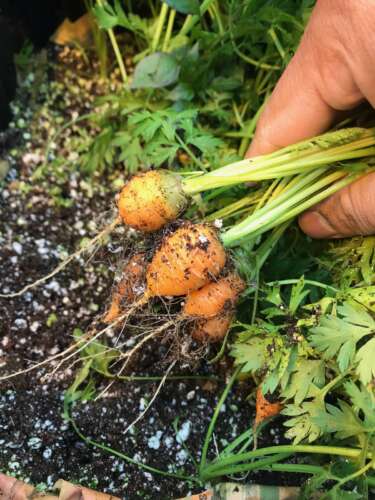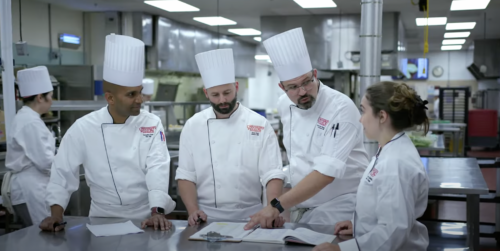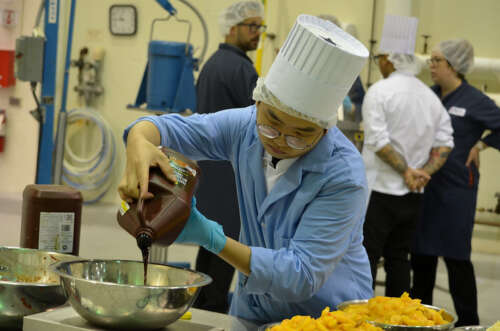
At the University of Guelph, farm-to-table isn’t just buzzy marketing speak. It is a real philosophy that executive chef Vijay Nair of Hospitality Services incorporates into everything his department does, with support from partnerships across campus that have proved plentiful.
This week marks the 25th anniversary of Ontario Agriculture Week, a time to celebrate the abundance of food this province’s farmers produce and the communities local growers support. Chef Nair and the Hospitality team do that every day, supporting local farmers and Ontario agriculture across all operations on campus.
The fresh chicken and a majority of the beef products across campus are sourced from within the province, along will all the milk. Most menu items at the 100 Mile Grille at Creelman Hall are grown or produced within 100 miles of campus.
Collaboration is the secret ingredient Nair and the Hospitality team employ to live the values of sustainability and innovation, serving up cuisine unique to U of G in the process.
In a kitchen full of professionals, the preparation, cooking and serving of food is second nature. At U of G, what is baked in is an opportunity to inform those skills with first-hand knowledge and experience of what it takes to grow ingredients.
“We started off really helping our cooks learn the importance of growing food,” says Nair, who oversees 20 food locations across campus including four core residence dining halls with Hospitality’s department head, Chris Herkimer.
“It’s about connecting the dots in how food comes from the farm to the kitchen.”
‘Learning how to use what we can grow best’

Executive chef Vijay Nair consults with fellow chefs in Hospitality Services
Connecting with Michael Smith, farm coordinator at the Guelph Centre for Urban Organic Farming in the Department of Plant Agriculture, Nair has fostered a mutual relationship. His chefs are connected to the food beneath their knives because some of it is harvested from the farm.
The garden provides a few thousand pounds of vegetables, lessening the footprint of the food required from suppliers. Before Hospitality chefs place orders, they also buy produce from the Elmira Produce Auction whenever possible.
“It’s important to use what is in season, what is available, what is fresh from the ground,” he says.
The Hospitality team is a flexible one, able to adapt at a moment’s notice. The chefs check in regularly with the farm to see what is growing and design a menu around what is available, rather than writing a menu and shopping for it. “It’s going to the farm and as a chef, learning how to use what we can grow best.”
This year that included rhubarb, asparagus, eggplant, peppers, squash, melons, a variety of tomatoes, herbs and greens.
The 2.5-acre demonstration farm is an opportunity to produce organic agriculture in a small, dense urban environment, Smith explains. In addition to supplying hospitality, the farm donates to the campus food bank and the campus community market.
“In one way or another, we’re making food more accessible to folks,” he says.
Partnerships with hospitality or, in the case of the market, the Sustainability Office, also help increase awareness of the farm’s existence.
In the summer when hospitality staff experience a slower pace, they lend a hand on the farm. “It’s a great bonus for us to have those extra, steady hands,” says Smith, who otherwise relies on students and volunteers.
For some, it means being present for the entire cycle – from the planting of seeds to the harvest to the processing of those ingredients in the kitchen.
Guelph Food Innovation Centre helps serve students, U of G at large

At the Guelph Food Innovation Centre in the Department of Food Science, Nair has made use of the power of scale, says director Derek Vella.
The 300-litre kettles in the production facility have been put to use creating large batches of ancho-peach barbecue sauce and a spicy tomato ketchup, free of high-fructose syrup.
“It has been great collaborating with Hospitality,” Vella says. “They bring the culinary knowledge and an understanding of what our students crave, and so it becomes learning for us, too.”
GFIC is also the birthplace of Cannon Fire, the U of G-made hot sauce grown, brewed and bottled by food science students. Vella says in development now is an ice cream and bean to bar chocolate program that he hopes to partner with Hospitality on in the future.
“We approach our role with the mandate of serving students, the food industry, and the University at large,” Vella says. “That’s why we get involved in partnerships.”
The more that Hospitality can collaborate with its partners across campus, Nair says, the more that everyone involved can grow to value food and develop an attachment to it. Caring enough to learn about how the food on our plates makes its way there, and acknowledging the love and dedication that goes into preparing the meals that nourish the U of G community is Nair’s ultimate goal.
“We find an avenue to do everything,” he says. “It’s all about connection.”
Contact:
Chef Vijay Nair
nairv@uoguelph.ca
